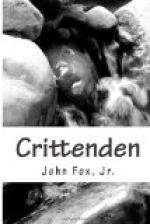It was growing dusk outside. Chickens were going to roost with a great chattering in some locust-trees in one corner of the yard. An aged darkey was swinging an axe at the woodpile and two little pickaninnies were gathering a basket of chips. Already the air was filled with the twilight sounds of the farm—the lowing of cattle, the bleating of calves at the cowpens, the bleat of sheep from the woods, and the nicker of horses in the barn. Through it all, Crittenden could hear the nervous thud of Raincrow’s hoofs announcing rain—for that was the way the horse got his name, being as black as a crow and, as Bob claimed, always knowing when falling weather was at hand and speaking his prophecy by stamping in his stall. He could hear Basil noisily making his way to the barn. As he walked through the garden toward the old family graveyard, he could still hear the boy, and a prescient tithe of the pain, that he felt would strike him in full some day, smote him so sharply now that he stopped a moment to listen, with one hand quickly raised to his forehead. Basil was whistling—whistling joyously. Foreboding touched the boy like the brush of a bird’s wing, and death and sorrow were as remote as infinity to him. At the barn-door the lad called sharply:
“Bob!”
“Suh!” answered a muffled voice, and Bob emerged, gray with oatdust.
“I want my buggy to-night.” Bob grinned.
“Sidebar?”
“Yes.”
“New whip—new harness—little buggy mare—reckon?”
“I want ’em all.”
Bob laughed loudly. “Oh, I know. You gwine to see Miss Phyllis dis night, sho—yes, Lawd!” Bob dodged a kick from the toe of the boy’s boot—a playful kick that was not meant to land—and went into the barn and came out again.
“Yes, an’ I know somewhur else you gwine—you gwine to de war. Oh, I know; yes, suh. Dere’s a white man in town tryin’ to git niggers to ‘list wid him, an’ he’s got a nigger sojer what say he’s a officer hisself; yes, mon, a corpril. An’ dis nigger’s jes a-gwine through town drawin’ niggers right an’ left. He talk to me, but I jes laugh at him, an’ say I gwine wid Ole Cap’n ur Young Cap’n, I don’t keer which. An’ lemme tell you, Young Capn’, ef you ur Ole Cap’n doan lemme go wid you, I’se gwine wid dat nigger corpril an’ dat white man what ’long to a nigger regiment, an’ I know you don’t want me to bring no sech disgrace on de fambly dat way—no, suh. He axe what you de cap’n of,” Bob went on, aiming at two birds with one stone now, “an’ I say you de cap’n of ever’body an’ ever’ting dat come ‘long—dat’s what I say-an’ he be cap’n of you wid all yo’ unyform and sich, I say, if you jest come out to de fahm—yes, mon, dat he will sho.”
The boy laughed and Bob reiterated:
“Oh, I’se gwine—I’se gwine wid you—” Then he stopped short. The turbaned figure of Aunt Keziah loomed from behind the woodpile.
“What dat I heah ’bout you gwine to de wah, nigger, what dat I heah?”




